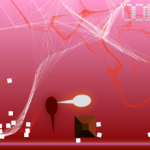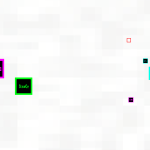Depression (2011)
July 6, 2011 - Features
Aaron Oldenburg’s Depression is a short entry in this past February’s Experimental Gameplay Project. If you’re not following the EGP, you should. The organizers come up with a short theme every month, and participants come up with a game prototype in seven days to fit it. You end up with lots of short, simple experiments that are occasionally really fantastic. For example, Loop Raccord [review] was an EGP game on the theme “Neverending.”
Games that take the theme as a starting point and glide off into something they just feel like doing are frequently the most interesting. The theme for February was “ASCII,” and the results were subsequently full of text used in unusual ways. Depression stood out not because its use of text was particularly clever, but because it presented such an elegant interaction metaphor.
Depression uses your webcam as the only input. When you start the game, the screen is full of eyes represented by the word “eye” in white text. The camera tracks the position of your face, the center of which is marked by the word “face.” The eyes move around randomly until there’s a face nearby, at which point they swarm towards it. If enough of the eyes gather around your position, the screen changes to the mirror view you see in the screenshot above. The textual eyes form a noisy background to a silhouette of your actual face, as recorded by the camera: note my absurd Marlo Thomas flip in the lower right-hand corner for orientation. This mode lasts for a few seconds, then returns to the original view.
This results in a dead-simple but surprisingly effective game about social anxiety. As the title hints, the game replicates the fear of being looked at when in a state of emotional distress. Social anxiety is very solipsistic. You see other people in terms of how they see you, which is why the enemies in Depression are eyes and not other faces. You can try to dodge these eyes by moving your face around, but they’ll eventually get to you. And when they do, you get an alarming reminder that your image is actually being recorded. A game that uses a webcam like this can make you feel exposed in a way that other forms of input can’t. It’s hard to escape the feeling that the game itself is watching you.
One of the fun things about Depression is figuring out strategies to keep the eyes away. These often turn out to be pretty good extensions of the central metaphor. You can, of course, look away from the screen. This keeps your face from being recognized, but you’re also not meaningfully playing the game anymore. You can also cover your face or the camera with your hands. When there’s no face in view, the eyes just wander around randomly. This isn’t exactly a winning state, but at least you’re protected from the mirror screen. You can always avoid scrutiny by not showing up.
My favorite strategy took a slightly different direction. I grabbed a nearby Polaroid of me and my boyfriend and held it up to the camera. When there are two faces in view, the eyes usually get evenly divided between them. This keeps them from reaching the critical mass that causes the mirror screen to appear. You could, of course, do the same thing by playing Depression as a co-op game. Having a partner makes things so much easier.



